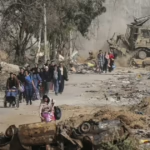The Catholic Bishops Conference of Nigeria (CBCN) has issued a stark warning that the country is on the verge of collapse, plagued by entrenched corruption, ineffective governance, and flawed electoral processes. Despite recognizing some improvements under the current government, the bishops emphasize the urgent need for comprehensive reforms.
Following their second plenary session in Ikot Ekpene, the bishops released a statement that not only critiques the nation’s challenges but also outlines a path toward recovery, prioritizing urgent electoral reforms as a critical step forward.
Signed by CBCN President Archbishop Lucius Iwejuru Ugorji of Owerri and Secretary Bishop Donatus Ogun of Uromi, the communiqué highlights persistent electoral issues such as violence, voter intimidation, and the manipulation of results. These problems have fueled widespread voter disillusionment, prompting a call for a thorough restructuring of the electoral system.
“To significantly curb electoral fraud in Nigeria, we advocate for robust reforms that include the electronic transmission of results directly from polling stations and their real-time digital collation,” the bishops declared.
They further stressed the necessity for impartial and transparent appointments of key officials within the Independent National Electoral Commission (INEC), insisting these individuals must be non-partisan and possess unimpeachable integrity. “Many current appointees have failed to meet these standards,” the statement noted.
Accordingly, the bishops urged legislative amendments to reinforce INEC’s autonomy and credibility, shielding it from political interference.
Additionally, the judiciary was called upon to uphold fairness and impartiality in electoral disputes, a vital component for sustaining national peace and stability.
While acknowledging government efforts such as infrastructure development, the introduction of a new minimum wage, and recent tax reforms, the bishops painted a sobering picture of the everyday struggles faced by Nigerians.
They voiced deep concern over the persistent poverty and economic distress afflicting the populace, describing a scenario where many citizens are left to endure hardship and insecurity, often forced to abandon their homes and means of livelihood.
The statement also drew attention to the deterioration of essential public services, particularly healthcare, where inadequate facilities have driven a mass departure of medical professionals and compelled political leaders to seek treatment abroad.
“While vast sums are spent overseas for medical care, millions of Nigerians suffer and perish from treatable diseases at home,” the communiqué lamented.
Similar challenges were noted in the education and energy sectors, with frequent power outages and insufficient funding undermining progress.
The bishops pinpointed corruption and poor governance as the fundamental causes of these systemic failures, describing them as a “cancer” eroding the nation’s foundation.
They sharply criticized the political elite for prioritizing power retention and strategizing for the 2027 elections over genuine governance aimed at public welfare.
Warning against the emergence of a de facto one-party system, the bishops cautioned that such a trend poses a serious threat to Nigeria’s democratic future.
In response, the CBCN committed to enhancing political awareness among the laity, encouraging Nigerians to engage in the democratic process guided by Christian values.
“We urge all eligible voters to obtain their permanent voter cards and participate in elections with informed and conscientious choices,” the bishops appealed.
They also strongly discouraged citizens from succumbing to bribery, intimidation, or divisive ethnic and religious influences during the electoral process.






















